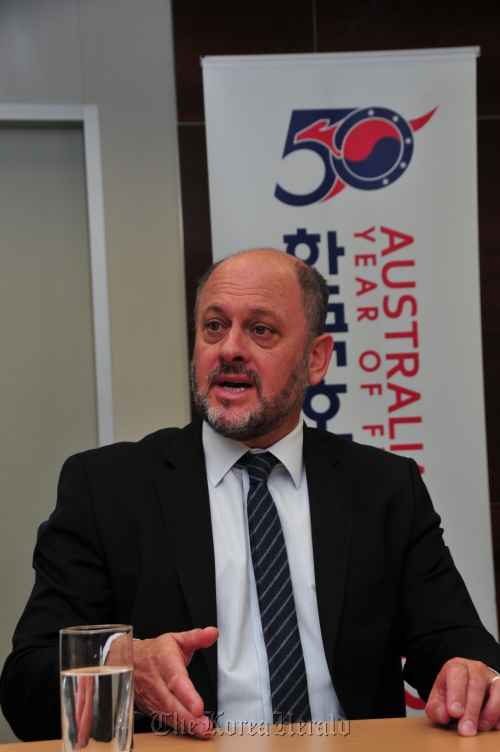 |
Tim Flannery |
Korea needs to act now, if it wants to achieve its carbon emissions reduction target and seize opportunities in the green energy sector, a climate guru said Thursday.
Environmentalist Tim Flannery said Korea’s target of a 30 percent cut in greenhouse emissions by 2020 from business as usual projections is of a similar scale to his native Australia. Canberra’s goal is to keep carbon dioxide output below 5 percent of the 2000 level by 2020, which translates into a reduction of 30 percent from the expected emission volume in 2020.
“These will be challenging targets to meet,” Flannery said in a press conference in Seoul. “We have eight years and three weeks to achieve them.” He is the chairman of the Copenhagen Climate Council, an international climate change awareness group.
Last month, Australia passed its clean energy bill, which seeks to levy taxes on carbon dioxide emissions of about 23 Australian dollars per ton. It will go into effect in July next year.
In Korea, the fourth-largest polluter in Asia, officials decided to introduce an emissions trading scheme, instead of carbon taxes. The original plan was to have the system up and running in 2013, but they had to defer it to 2015, after strong resistance from industry. A related bill is pending at the National Assembly.
“By 2050, we have to be living in a de-carbonized global economy. That means an almost unimaginably large increase in deployment of clean energy technologies,” Flannery said.
“Opportunities are there for countries like Korea. Green energy will be a great growth engine in the future,” he added.
Korea aims to increase the share of renewable and alternative energy in power supply to 2 percent next year and beyond 10 percent eventually.
At the same time, it is pushing to boost the share of nuclear energy from 34.2 percent in 2010 to nearly 50 percent by 2020. Some environmentalists demand the nuclear plan be scrapped, saying the Korean government is failing to learn from this year’s nuclear disaster in Japan.
On the nuclear-energy controversy, Flannery said he did not condemn nuclear energy.
If a country can’t secure a sufficient energy supply, even after sufficient measures have been taken to raise energy sufficiency and maximize the use of clean energy, then it may turn to nuclear power plants, he said.
“Nuclear energy could be a preferable source than coal fired power plants, because of the damage that climate change is doing to the planet.”
By Lee Sun-young (
milaya@heraldcorp.com)





![[Herald Interview] 'Trump will use tariffs as first line of defense for American manufacturing'](http://res.heraldm.com/phpwas/restmb_idxmake.php?idx=644&simg=/content/image/2024/11/26/20241126050017_0.jpg)


